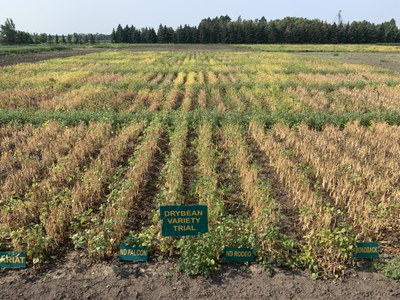Fargo, North Dakota, USA
December 22, 2023

Crop variety selection is one of the most important crop management decisions to be made to optimize seed yield and quality. (NDSU photo)
Farmers and crop advisers needing crop variety information to make decisions for the 2024 crop season now have available the North Dakota State University Extension 2023 soybean and dry bean variety guides. These publications can be accessed online at ndsu.ag/varietytrials23. Printed copies are available at NDSU Extension county offices and Research Extension Centers.
“Crop variety selection is one of the most important crop management decisions to be made to optimize seed yield and quality,” according to Greg Endres, NDSU Extension agronomist and lead author of the two variety guides.
Endres encourages farmers to spend adequate time doing their homework to select the very best variety choices for their fields. NDSU crop breeders, research agronomists and numerous support staff have devoted substantial resources to generate this data to aid in making decisions regarding variety use.
The soybean 2023 variety trial results and selection guide contains 33 tables of agronomic, and seed yield and quality data from 28 NDSU research sites across the state. The trial tables are identified based on the general categories of herbicide-resistant or conventional. The guide also provides an overview on soybean variety selection (besides seed yield), including plant maturity, tolerance to iron-deficiency chlorosis, resistance to disease, including phytophthora root and stem rot and soybean cyst nematode, and herbicide-resistance traits. In addition, a table in the guide lists the 26 seed companies that submitted varieties for NDSU testing and their websites to allow you to obtain details on their respective varieties.
The new dry bean variety trial results and selection guide provides the opportunity to view 20 variety trial tables from eight North Dakota and Minnesota research sites. The bulk of data is associated with performance of pinto bean varieties, but variety data is also available from black, navy, great northern, pink, small red and cranberry market classes.
Besides an expansion of the number of data tables in this year’s guide, a table has been added that indicates pinto bean direct-harvest ratings. In addition, the number of varieties listed and their sources (origin or owner) has increased compared to previous issues of the guide.
Crop variety selection is one of the most important crop management decisions to be made to optimize seed yield and quality. (NDSU photo)